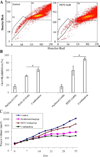NF-kappaB pathway inhibitors preferentially inhibit breast cancer stem-like cells
- PMID: 17965935
- PMCID: PMC3320112
- DOI: 10.1007/s10549-007-9798-y
NF-kappaB pathway inhibitors preferentially inhibit breast cancer stem-like cells
Abstract
Accumulating evidence indicates that breast cancer is caused by cancer stem cells and cure of breast cancer requires eradication of breast cancer stem cells. Previous studies with leukemia stem cells have shown that NF-kappaB pathway is important for leukemia stem cell survival. In this study, by using MCF7 sphere cells as model of breast cancer stem-like cells, we evaluated the effect of NF-kappaB pathway specific inhibitors on human breast cancer MCF7 sphere cells. Three inhibitors including parthenolide (PTL), pyrrolidinedithiocarbamate (PDTC) and its analog diethyldithiocarbamate (DETC) were found to preferentially inhibit MCF7 sphere cell proliferation. These compounds also showed preferential inhibition in term of proliferation and colony formation on MCF7 side population (SP) cells, a small fraction of MCF7 cells known to enrich in breast cancer stem-like cells. The preferential inhibition effect of these compounds was due to inhibition of the NF-kappaB activity in both MCF7 sphere and MCF7 cells, with higher inhibition effect on MCF7 sphere cells than on MCF7 cells. PDTC was further evaluated in vivo and showed significant tumor growth inhibition alone but had better tumor growth inhibition in combination with paclitaxel in the mouse xenograft model than either PDTC or paclitaxel alone. This study suggests that breast cancer stem-like cells could be selectively inhibited by targeting signaling pathways important for breast cancer stem-like cells.
Figures




Similar articles
-
Cancer stem/progenitor cell active compound 8-quinolinol in combination with paclitaxel achieves an improved cure of breast cancer in the mouse model.Breast Cancer Res Treat. 2009 May;115(2):269-77. doi: 10.1007/s10549-008-0072-8. Epub 2008 May 28. Breast Cancer Res Treat. 2009. PMID: 18506619 Free PMC article.
-
A potential target associated with both cancer and cancer stem cells: a combination therapy for eradication of breast cancer using vinorelbine stealthy liposomes plus parthenolide stealthy liposomes.J Control Release. 2008 Jul 2;129(1):18-25. doi: 10.1016/j.jconrel.2008.03.022. Epub 2008 Apr 4. J Control Release. 2008. PMID: 18466993
-
Disulfiram inhibits TGF-β-induced epithelial-mesenchymal transition and stem-like features in breast cancer via ERK/NF-κB/Snail pathway.Oncotarget. 2015 Dec 1;6(38):40907-19. doi: 10.18632/oncotarget.5723. Oncotarget. 2015. PMID: 26517513 Free PMC article.
-
Paclitaxel efficacy is increased by parthenolide via nuclear factor-kappaB pathways in in vitro and in vivo human non-small cell lung cancer models.Curr Cancer Drug Targets. 2010 Nov;10(7):705-15. doi: 10.2174/156800910793605776. Curr Cancer Drug Targets. 2010. PMID: 20578985
-
Dimethyl Fumarate Inhibits the Nuclear Factor κB Pathway in Breast Cancer Cells by Covalent Modification of p65 Protein.J Biol Chem. 2016 Feb 12;291(7):3639-47. doi: 10.1074/jbc.M115.679704. Epub 2015 Dec 18. J Biol Chem. 2016. PMID: 26683377 Free PMC article.
Cited by
-
Parthenolide inhibits cancer stem-like side population of nasopharyngeal carcinoma cells via suppression of the NF-κB/COX-2 pathway.Theranostics. 2015 Jan 1;5(3):302-21. doi: 10.7150/thno.8387. eCollection 2015. Theranostics. 2015. PMID: 25553117 Free PMC article.
-
13R,20-Dihydroxydocosahexaenoic Acid, a Novel Dihydroxy- DHA Derivative, Inhibits Breast Cancer Stemness through Regulation of the Stat3/IL-6 Signaling Pathway by Inducing ROS Production.Antioxidants (Basel). 2021 Mar 15;10(3):457. doi: 10.3390/antiox10030457. Antioxidants (Basel). 2021. PMID: 33804152 Free PMC article.
-
From inflammaging to healthy aging by dietary lifestyle choices: is epigenetics the key to personalized nutrition?Clin Epigenetics. 2015 Mar 25;7(1):33. doi: 10.1186/s13148-015-0068-2. eCollection 2015. Clin Epigenetics. 2015. PMID: 25861393 Free PMC article.
-
Multidrug-resistant cancer cells and cancer stem cells hijack cellular systems to circumvent systemic therapies, can natural products reverse this?Cell Mol Life Sci. 2017 Mar;74(5):777-801. doi: 10.1007/s00018-016-2362-3. Epub 2016 Sep 12. Cell Mol Life Sci. 2017. PMID: 27622244 Free PMC article. Review.
-
Parthenolide induces apoptosis via TNFRSF10B and PMAIP1 pathways in human lung cancer cells.J Exp Clin Cancer Res. 2014 Jan 6;33(1):3. doi: 10.1186/1756-9966-33-3. J Exp Clin Cancer Res. 2014. PMID: 24387758 Free PMC article.
References
-
- Howe HL, Wingo PA, Thun MJ, Ries LA, Rosenberg HM, Feigal EG, Edwards BK. Annual report to the nation on the status of cancer (1973 through 1998), featuring cancers with recent increasing trends. J Natl Cancer Inst. 2001;93:824–842. - PubMed
-
- Peto R, Boreham J, Clarke M, Davies C, Beral V. UK and USA breast cancer deaths down 25% in year 2000 at ages 20–69 years. Lancet. 2000;355:1822. - PubMed
-
- EBCT. Polychemotherapy for early breast cancer: an overview of the randomised trials. Early Breast Cancer Trialists’ Collaborative Group. Lancet. 1998;352:930–942. - PubMed
-
- EBCT. Tamoxifen for early breast cancer: an overview of the randomised trials. Early Breast Cancer Trialists’ Collaborative Group. Lancet. 1998;351:1451–1467. - PubMed
Publication types
MeSH terms
Substances
Grants and funding
LinkOut - more resources
Full Text Sources
Other Literature Sources
Medical

